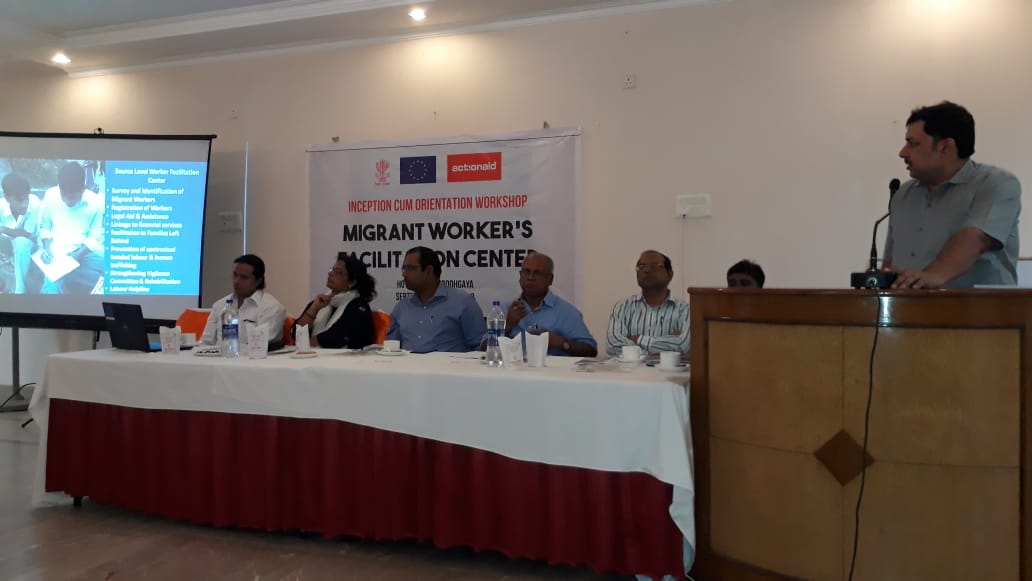As we all know, Bihar has a long history of labour migration. Over the last two decades, agrarian distress and impoverishment have added to labour outflow from the state to a variety of destinations across the country and even abroad. However, urban areas in India have not been built or provisioned to serve vulnerable populations that live there or come there as migrants in search of livelihood. The vulnerability of out-of-state migrants has also been tragically revealed in recent months. Across both rural and urban contexts, migrants are often forced to live in abysmal conditions, with poor or no access to amenities including electricity, drinking water and toilets. As migrants, very often, they remain deprived of access to public entitlements and welfare schemes in the areas they go to in search of work.
ActionAid India’s Bihar & Jharkhand Regional Office is implementing a project with the Labour Resources Department, Government of Bihar to provide support services to migrant workers, both in source and destination areas. We will be setting up Worker Facilitation Centres in source areas and Migration Support Centres at destination sites to support vulnerable migrant workers and their families. Gaya has been chosen as the pilot district under the project as the site for setting up source-based services, and 24 cities across the country have been identified as possible sites to locate destination-based support services.
Taking on Tata Institute of Social Sciences, Bihar as knowledge partner, an inception workshop was organized on September 24-25, 2018. Held in Gaya, the programme witnessed active participation of more than 100 representatives from government departments, NGOs and activists, including both the District Magistrate and the District Labour Commissioner of Gaya. We witnessed intense discussions around the labour migration scenario in Bihar, bonded labour, child labour and human trafficking, including the various strategies to mitigate these. We explored in detail the role that could be played by the Worker Facilitation Centres and Migration Support Centres. The key services to be provided by the Worker Facilitation Centres include surveys to establish incidence of migration and identify prominent destination and occupational sectors; registration of workers; legal aid for workers; their linkages to financial services and social security schemes; and establishing a labour helpline for them. The Migration Support Centres would be responsible for mapping of prominent migrant streams and clusters at the destination; facilitating migrant workers’ access to healthcare facilities; creating awareness among migrant population on social security services and labour welfare-related laws; ensuring immediate response to cases of bonded and child labour; follow-up of cases of accidents of labourers and violation of compensation-related provisions; and running a labour helpline. Sh. Abhishek Singh, District Magistrate, Gaya expressed his happiness over the roll-out of this project, expressing hope that the initiative would go a long way in making labour migration more secure, and in ensuring due rights, entitlements and a life of dignity to migrant workers.
During the past few months, more than 3000 migrant labourers have been tracked. An analysis of the data reveals that about a quarter of the migrants are women. Further analysis shows that people belonging to the age group of 19-30 years form a majority of the migrants at 37%. However, the major cause of concern remains that about a quarter of the migrants are minors i.e. below the age of 18 years. It must also be noted that Gaya district has a high incidence of child labour as well as bonded labour, many of them rescued and brought back from the various destination states. Our effort is to ensure safe migration for adults and to curb the incidence of child labour through awareness-generation and sensitization of concerned stakeholders. Six panchayat-level monitoring committees have already been formed whose members track the migrant workers and make them aware about their rights. Through collaboration with the Labour Resources Department, 425 workers were registered under The Building and Other Construction Workers (Regulation of Employment and Conditions of Service) Act, 1996 (BOCW Act). In addition, 132 bonded labourers, who were released earlier, were tracked and their bank accounts opened for transfer of the rehabilitation packages.
 Author: Saurabh Kumar, ActionAid India Bihar & Jharkhand Regional Office
Author: Saurabh Kumar, ActionAid India Bihar & Jharkhand Regional Office




